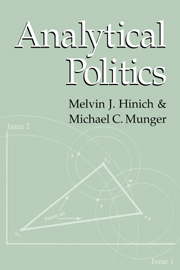Section I - Basics
Published online by Cambridge University Press: 05 June 2012
Summary
The basic model of analytical politics addresses both normative and positive questions about human political action. Formal theories help social scientists explore “what if?” questions by deducing the implications of a set of premises. This approach has several advantages over other forms of theorizing, as we shall see. An important advantage of analytical theory is the ability to evaluate different forms of democratic choice.
The middle, or the center of the distribution of enfranchised citizens, is where political power is believed to reside. For at least 2,500 years, philosophers have argued about whether the policies resulting from different forms of democratic choice are just. The contribution of analytical theory is to make precise the consequences of different forms of choice and different sets of desires by citizens.
To make this idea of the “middle” precise, we first consider the idea of the median voter, under the assumption that there is but one policy government must choose. This definition of the middle is then extended to account for the fact that government must make many choices all at once. It turns out that the “middle” may not exist, or that there are many middles, if policy choices inherently involve several issues at once.
Further, this problem of indeterminacy of majority rule is not confined to any one institution or way of choosing. All institutions of aggregating arbitrarily chosen preferences exhibit an inability to make a unique choice among three or more alternatives.
- Type
- Chapter
- Information
- Analytical Politics , pp. 1 - 2Publisher: Cambridge University PressPrint publication year: 1997



